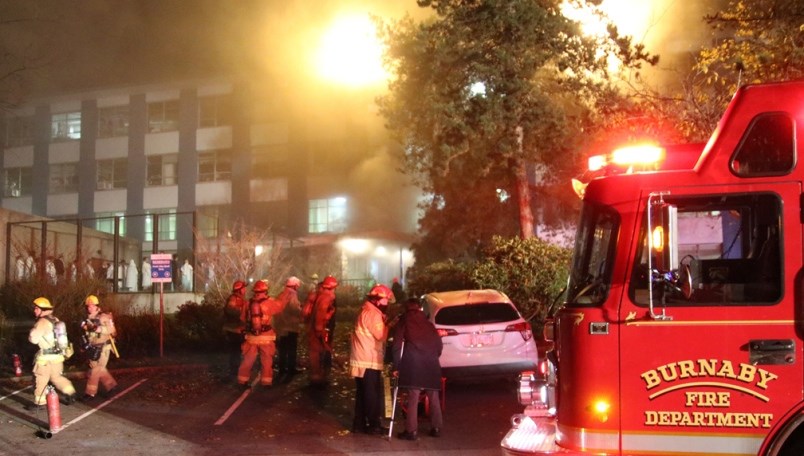It’s been two months since a fire damaged Burnaby Hospital’s outpatient clinic and 30-bed inpatient unit for mental health and substance-use patients – and health officials have yet to announce any plans to replace them.
The Burnaby Fire Department said the Nov. 15 fire started in a common area or recreation room on the second floor of the Cascade Building, which had housed inpatient and outpatient services for mental health and substance use patients.
The blaze rendered those areas unusable.
So for two months now, psychiatric patients who come to the hospital’s emergency room and need to be admitted have been shipped to other hospitals, in particular Langley Memorial and Ridge Meadows, where “additional capacity” has been added, according to Fraser Health.
Staff with the outpatient clinic, meanwhile, are still working without office space or a clinic to see patients or administer medications.
“At this time, mental health and substance-use staff at Burnaby Hospital continue to primarily work off-site, and we continue our efforts to procure space and technology needed to support our patients, clients, and staff,” read an emailed statement from Fraser Health public affairs consultant Carrie Stefanson.
She said in-person outpatient visits are currently being accommodated "as needed," and patients can have appointments via Zoom and the telephone.
“Our virtual visits are a safe and effective way to reach clients during COVID-19,” Stefanson wrote.
In addition, Stefanson said mental health and substance-use outreach teams are continuing to connect with patients directly in the community.
An anonymous letter alerted the NOW to the state of mental health services at the hospital.
It stated services to patients with mental health and substance-use issues have been “greatly affected” by the loss of the outpatient clinic and psychiatric unit after the fire.
At first, most outpatient staff had worked from home and were expected to use their own computers, data and phones to provide patient care, according to the letter.
It said staff weren’t given work computers and phones until just before the holidays.
Asked if that was true, Stefanson didn’t answer directly, saying only:
“Due to the extensive damage caused by the fire, there was limited physical space and access to Fraser Health technology for mental health and substance-use staff. Some staff worked from home and connected with clients virtually, while others were able to access other Fraser Health sites to conduct their work.”
The letter said the leadership team at the hospital had told staff there was a plan to renovate an existing ward for a new inpatient psychiatric unit, but no timeline was given.
As for finding space for outpatient services, the letter said hospital leadership cited “expense to lease and the high cost of real estate in Burnaby” as barriers.
“It is shocking that expense is the barrier for having a new and functioning mental health clinic in Burnaby,” stated the letter. “The clients with mental health and substance-use issues are a very vulnerable population with special care needs.”
Stefanson, however, said cost wasn't the issue.
“Staff are aware that we are exploring options,” she said. “The cost of leasing space is not hindering our planning process."
When asked for details about the plan to restore the outpatient clinic and inpatient psychiatric unit, Stefanson said: “We will share more about our plans at Burnaby Hospital as soon as they are confirmed.”
The anonymous letter, meanwhile, warned of dire consequences if something wasn’t done soon.
“Fraser Health needs to prioritize having a renovated space for inpatient care and outpatient services," it said. "The patients and families in Burnaby need this support before the current model of care leads to an unfortunate patient-care event.”
Follow Cornelia Naylor on Twitter @CorNaylor
Email [email protected]



